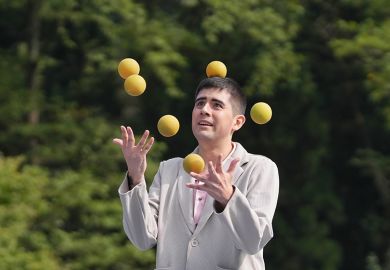Whether or not it’s cutting through with voters yet, the industrial strategy remains central to the UK government’s plans for economic growth. That’s why the recent Post-16 Education and Skills White Paper seeks to secure the pipeline of skilled workers that will be needed to deliver it.
The paper promises to tackle “critical skills gaps” and signals an ambition to align post-16 provision more directly with the strategy’s eight priority sectors (IS-8) – including life sciences, digital technologies, clean energy and the creative industries. It also promises to revive maintenance grants “to support disadvantaged students studying courses that support our missions and Industrial Strategy”.
However, the courses that the government appears to have in mind are in science, technology, engineering and mathematics (STEM) disciplines. Of course these will help power vital R&D and achieve breakthroughs in emerging technologies. However, focusing overwhelmingly on STEM risks overlooking the valuable, multifaceted and sometimes unexpected contributions to IS-8 sectors of other academic fields.
Study in SHAPE disciplines – social sciences, humanities and the arts – develops the skills that underpin a modern workforce: critical thinking, communication and creativity. These are not peripheral to the industrial strategy but essential to it. Given the growing importance and prevalence of AI, these skills will also support sectors to use emerging technologies critically and responsibly.
New Russell Group analysis of graduate outcomes data reveals that 91 per cent of STEM graduates from high-tariff, research-intensive universities enter an IS-8 sector within five years of completing their first degrees – but so do 85 per cent of non-science graduates (the combined figure is 87 per cent).
Our analysis suggests that what counts as a IS-8-aligned degree may not be as narrow as some policymakers imagine. For instance, while 20 per cent of high-tariff English literature graduates enter the creative industries and 47 per cent enter professional services, 7 per cent progress to digital technologies. So do 8 per cent of high-tariff graduates in sociology, social policy and anthropology and 12 per cent of politics students. In total, 40 per cent of high-tariff graduates working in defence studied humanities and social sciences.
Equally surprisingly, while 16 per cent of high-tariff engineering graduates end up in advanced manufacturing and 11 per cent work in digital technologies, 46 per cent work in professional services.
Such statistics are important to communicate widely given the White Paper’s expressed intention to rejig tertiary provision in an effort to fill skills gaps as quickly as possible. Skills England is taking the first steps in properly scoping out skills strengths and needs, nationally and regionally, and the recent shunting of the skills ministerial brief into the Department for Work and Pensions indicates an intention to better connect skills provision, in its many shapes and sizes, to the jobs market.
Our analysis suggests that a narrow focus on subjects is the wrong way to do that.
Our high-growth sectors need diverse skills to be successful. For example, consecutive governments have championed spin-outs, but to scale up and attract sizeable investment, these businesses not only need the scientists or engineers who make the technical breakthroughs, but a whole range of legal, creative, strategic and critical thinking skills – which SHAPE education provides.
Promisingly, the White Paper acknowledges the importance of postgraduate skills in IS-8 growth. The few extra years that postgraduates spend honing their critical thinking and analysis skills build their confidence in self-directing projects and allow them to gain intimate knowledge of particular industries. This is reflected in our data, with 92 per cent of those having completed a postgraduate research (PGR) degree at any UK university progressing to IS-8 sectors within five years after graduation.
However, efforts are needed to secure that pipeline. While the Department for Education forecasts a 53 per cent rise in demand for workers with higher degrees by 2035 – the fastest demand growth across all qualification levels – admission of UK researchers to postgraduate degrees has fallen by 10 per cent since 2018-19. Research-intensive universities (which host 57 per cent of UK PGRs) need support and funding to sustain and grow their postgraduate research populations, and it’s welcome to see positive intentions towards this in the White Paper.
However, if SHAPE subjects are not championed alongside STEM – through funding and the right advice and guidance to students – then IS-8 businesses’ ability to recruit and develop the talented workers they need could be undermined by emerging SHAPE cold spots.
If the industrial strategy is to succeed, we’ll need English graduates as well as engineers, historians alongside computer scientists, and social scientists together with health professionals. To assume otherwise would be to do a grave disservice to students, universities and the economy.
Charlotte Hallahan is a policy manager at the Russell Group.
Register to continue
Why register?
- Registration is free and only takes a moment
- Once registered, you can read 3 articles a month
- Sign up for our newsletter
Subscribe
Or subscribe for unlimited access to:
- Unlimited access to news, views, insights & reviews
- Digital editions
- Digital access to THE’s university and college rankings analysis
Already registered or a current subscriber?








